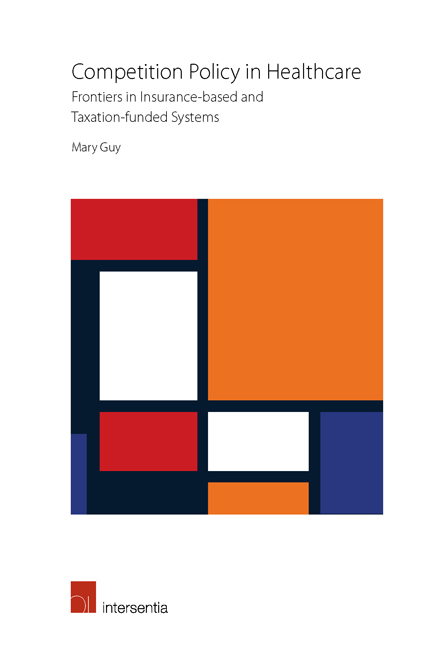Book contents
- Frontmatter
- Foreword
- Preface
- Acknowledgements
- Contents
- List of Cases
- List of Legislation
- Table of Figures
- Abbreviations
- Introduction
- Chapter 1 Competition Reforms in Dutch and English Healthcare and the Development of Competition Policy
- Chapter 2 Competition Law: Its Applicability and Application in Dutch and English Healthcare
- Chapter 3 Sectoral Regulation: The Relationship between the Competition Authority and the Healthcare Regulator in the Netherlands and England
- Chapter 4 Merger Control: Hospital Mergers, General Merger Control and the Development of ‘Healthcare-Specific’ Merger Control in the Netherlands and England
- Conclusion
- Bibliography
- Index
- About the Author
Chapter 2 - Competition Law: Its Applicability and Application in Dutch and English Healthcare
Published online by Cambridge University Press: 30 March 2019
- Frontmatter
- Foreword
- Preface
- Acknowledgements
- Contents
- List of Cases
- List of Legislation
- Table of Figures
- Abbreviations
- Introduction
- Chapter 1 Competition Reforms in Dutch and English Healthcare and the Development of Competition Policy
- Chapter 2 Competition Law: Its Applicability and Application in Dutch and English Healthcare
- Chapter 3 Sectoral Regulation: The Relationship between the Competition Authority and the Healthcare Regulator in the Netherlands and England
- Chapter 4 Merger Control: Hospital Mergers, General Merger Control and the Development of ‘Healthcare-Specific’ Merger Control in the Netherlands and England
- Conclusion
- Bibliography
- Index
- About the Author
Summary
INTRODUCTION
One of the controversial aspects of the Health and Social Care Act 2012 (HSCA 2012) was the apparent underscoring of the applicability of general competition law – the provisions governing anticompetitive agreements and abuse of dominance in the Competition Act 1998 (CA98) and Articles 101 and 102 of the Treaty on the Functioning of the European Union (TFEU) – to the English NHS. There had been a growing consensus that competition law was indeed applicable, partly in consequence of the expansive requirement for an ‘undertaking’ which does not distinguish between public and private ownership, and likely as a result of the expanding private provision of NHS services, and increased autonomy of NHS Foundation Trusts and their similarities with commercial entities. Consequently, the enactment of the HSCA 2012 may be considered to mark a turning-point in terms of the consequences of making the applicability of competition law explicit. This was in contrast to the ‘new style of competition law’ formed by the New Labour policy rules, which have been described as competition law principles (as distinct from competition law) and an alternative source of competition law. What the HSCA 2012 could not do, however, was to change the underlying, fundamental nature of the NHS as a quasi-market, and so conceptions of a ‘new style of competition law’ may still be appropriate to describe the HSCA 2012 reforms. Certainly the total absence of cases assessed under the CA98 and the TFEU thus far can be attributed as much to confusion about the extent of the substantive law in this area (including what applying competition law can usefully achieve in healthcare reform) as to the complexity of the regulatory regime – the NHS Provider Licence and the National Health Service (Procurement, Patient Choice and Competition) (No. 2) Regulations 2013 (the 2013 Regulations) – implemented alongside and subsequent to the HSCA 2012 and the associated interaction between the Competition and Markets Authority (the CMA) and NHS Improvement. Indeed, the respective priorities of these two agencies, ongoing political sensitivity attached to the NHS and perhaps recognition that competition cases are problematic in terms of cost and complexity may also have played a part in recourse to regulatory rules emerging as a more proportionate response to potentially anticompetitive behaviour.
- Type
- Chapter
- Information
- Competition Policy in HealthcareFrontiers in Insurance-based and Taxation-funded Systems, pp. 61 - 114Publisher: IntersentiaPrint publication year: 2019



